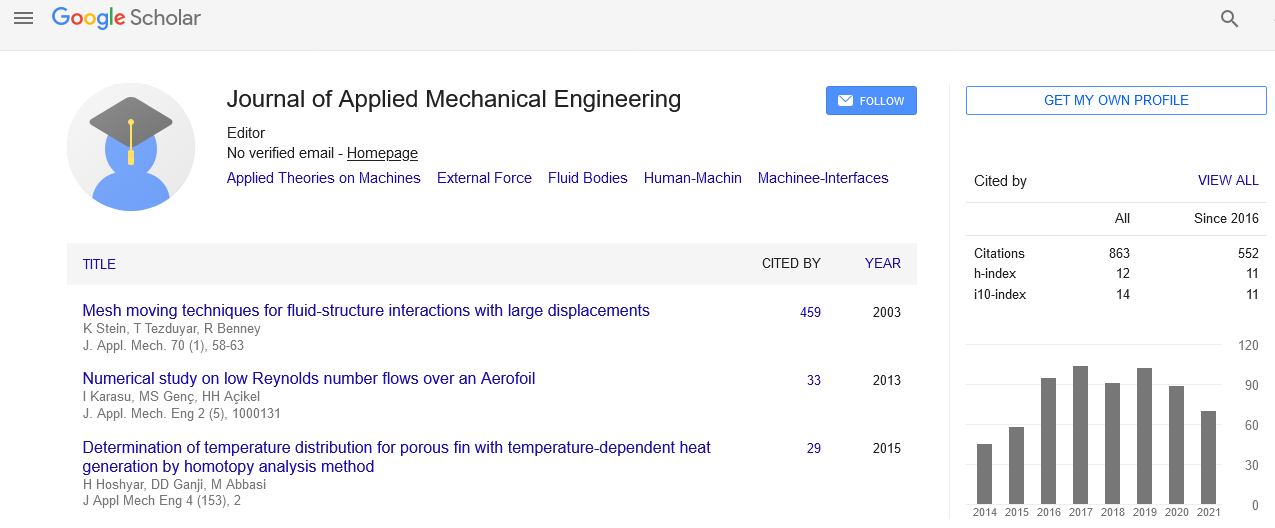Indexed In
- Genamics JournalSeek
- JournalTOCs
- CiteFactor
- RefSeek
- Hamdard University
- EBSCO A-Z
- OCLC- WorldCat
- Publons
- Google Scholar
Useful Links
Share This Page
Journal Flyer

Open Access Journals
- Agri and Aquaculture
- Biochemistry
- Bioinformatics & Systems Biology
- Business & Management
- Chemistry
- Clinical Sciences
- Engineering
- Food & Nutrition
- General Science
- Genetics & Molecular Biology
- Immunology & Microbiology
- Medical Sciences
- Neuroscience & Psychology
- Nursing & Health Care
- Pharmaceutical Sciences
Thermal behaviour of RHCM mold with different heating/cooling channel designs
International Conference on Design and Production Engineering
July 25-26, 2016 Berlin,Germany
Fatma Kria, Moez Hammami and Mounir Baccar
National School of Engineers of Sfax, Tunisia
Scientific Tracks Abstracts: J Appl Mech Eng
Abstract:
Rapid Heat Cycle Molding (RHCM) is a thermoplastic injection molding process which was recently developed. The principle of this technology consists a rapid heating of the mold till the glass transition temperature of the polymer Tg, and then, injecting the melting polymer into the mold cavity. At this level, the cooling stage begins and continues until cooling down the polymer to a temperature permitting the ejection of the finished product without any deformation. After ejection, the mold is heated again and the next RHCM cycle begins. To succeed an RHCM process, we must guarantee both goals: firstly, the heating/cooling rapidity ensuring high process productivity and; secondly, temperature uniformity at the cavity surface providing good products quality. This study is focused on the thermal control system of RHCM mold producing complex shaped automotive part. To achieve our objectives, numerical simulations of heat transfer in cavity/core plates, polymer and coolant through some RHCM cycle have been undertaken to obtain the cyclic "steady-state". Gambit 2.3.16 has been used to produce the gird for the CFD solver. The commercial software Fluent 6.3.26, which is based on a finite volume method, has been used. Several arrangements of heating/cooling channels have been proposed and compared. The limitation of a classic conformal design has been demonstrated and the importance of an original conformal design has been proved. In fact, with this design, we could greatly reduce the cycle time, temperature gap and energy consumption. Also, in this work, we have provided in evidence the importance of the cooling thermal behavior (contrary to the hypothesis of a constant cooling temperature used in the previous reserchs) to grantuate the precision of the predicted RHCM cycle.
Biography :
Fatma Kria has obtained her Engineering Diploma in 2008 and Master's degree in Materials and Surfaces (2012). Currently, she is a PhD Student at the unit of Computational Fluid Dynamics and Transfer Phenomena in the Department of Mechanics at the National Engineering School of Sfax, Tunisia under the supervision of Prof. Mounir Baccar and Prof. Moez Hammami. She has published two papers in international journals and have participated in four international conferences. She is a Contractual Assistant at the Preparatory Institute of Engineer of Monastir, Tunisia. Also, she has taught courses at the National Engineering School of Sfax, Tunisia.
Email: fatmakria1984@yahoo.fr

